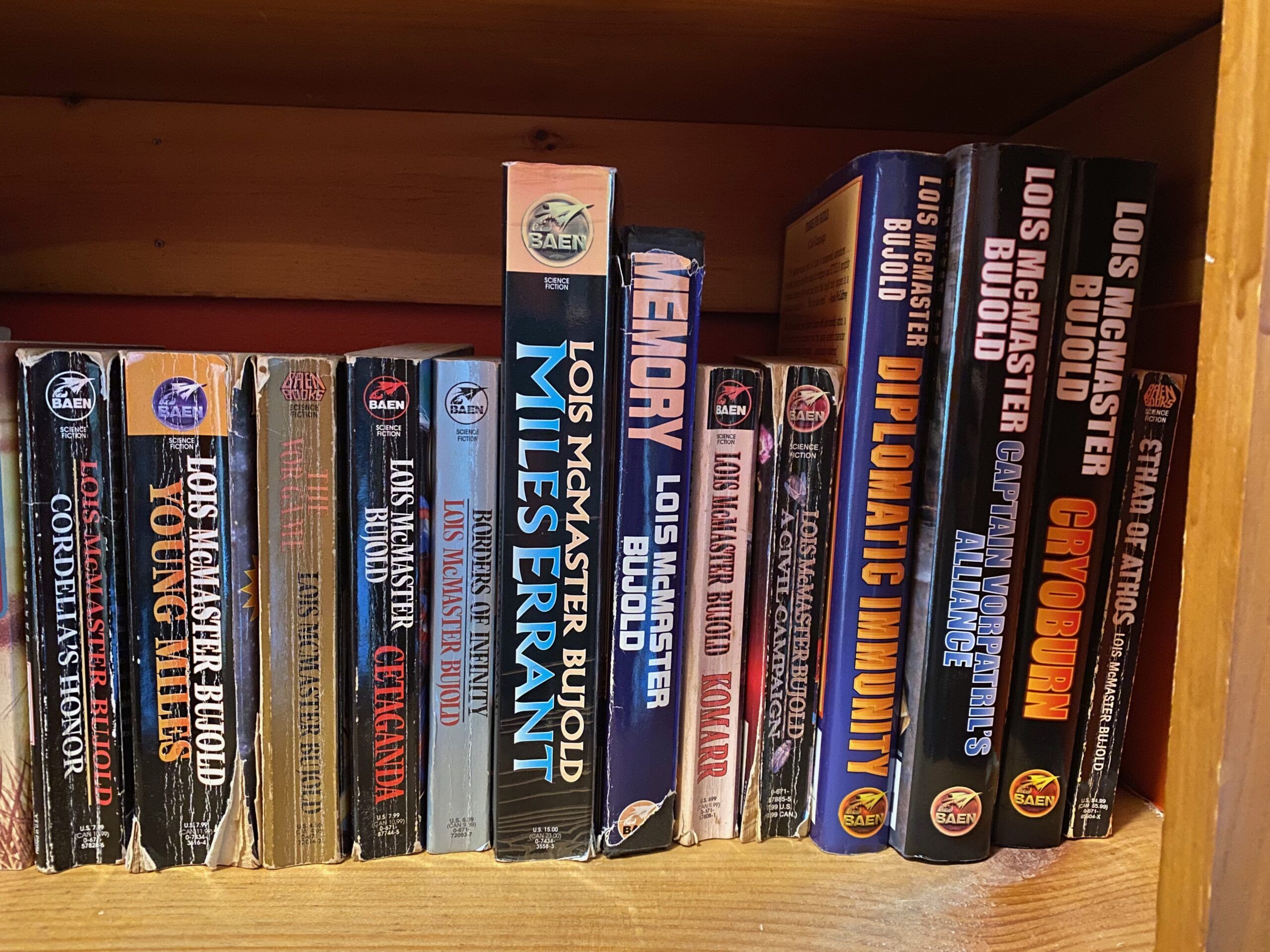If you ask me for my favorite book, I will go quiet. “Favorite book” is a hard ask for most book lovers. How are we supposed to pick? But as much as I hate playing the favorites game, I do have a favorite series. No matter how many other series I fall in love with, Lois McMaster Bujold’s Vorkosigan Saga will always be my favorite. It’s the series that made me a sci-fi reader. It’s tied up in who I am as a reader. It’s what I return to when I’m upset, stressed out, exhausted. I’ve lost count of the number of times I’ve reread my favorite books. The Vorkosigan Saga is a twisting, surprising, action-packed, human-centered space opera. There are 15 novels in the main series, two related ones set in the same universe, and a handful of novellas. The first book, Shards of Honor, was published in 1986. The most recent, Gentleman Jole and the Red Queen, came out in 2016. I’ve read the whole series through twice. My first read took place over many years. I read the bulk of the books in high school, and then read new ones as they came out. On my most recent reread, in 2020, I read the whole thing, in order, in a month. At 34, I was a very different reader than I was at 15, when I first read Shards of Honor. Sure, the series has its flaws. The vast majority of sci-fi published the 1980s has flaws. And I’m not going to pretend that I can be objective about it, because I have a deep emotional connection to the world and its characters. But what struck me, on this most recent reread, was how well the series stands up. I was consistently impressed with Bujold’s mastery of the series as a form. I picked up on small details I hadn’t noticed before. I started to paying attention to the way Bujold plots each novel and to how each book connects to the others. I noticed patterns. Certain things started to jump out at me: how the books end, the ways the characters change over time, the many different kinds of stories contained in the series as a whole. I enjoyed that 2020 reread immensely. It also felt like a masterclass in how to write a long-running series that doesn’t get boring. I may not be able to objectively judge a series so close to my heart, but reading isn’t supposed to be objective, anyway. The Vorkosigan Saga is a brilliant piece of work, and its brilliance isn’t random. Bujold makes specific choices, and those choices are what makes the series so good. Sci-fi might not be your thing, and that’s fine. But if you’re on the lookout for a fantastic long-running series in any genre, here are the five things Bujold does with the Vorkosigan Saga that make for a continually engaging and never-stagnant long-running series.
Lots of Characters & POVs
Part of the appeal of a series is getting to hang out with same characters for thousands and thousands of pages, but it helps if more than one character gets the spotlight. It also helps if characters stick around, even if they’re no longer the focus of the series. The bulk of the Vorkosigan Saga concerns Miles Vorkosigan, the disabled son of one of the planet’s most powerful/respected/feared political and military leaders. He’s a force of a nature, a complex and fascinating character. He carries a lot of the series — but he doesn’t carry it alone. There are several books that don’t concern Miles, where supporting characters take center stage. And throughout the series, Bujold uses a chorus of POVs. Even in the books that center Miles, there are often sections told from other characters’ perspectives. The result is that even the somewhat minor characters feel incredibly real; they have their own voices and stories and opinions. This rotating POV creates familiarity, and it keeps the series from just being a chronicle of one man’s life.
Many Different Kinds of Stories
There’s certainly something to be said for a series that uses the same formula over and over again (a cozy mystery series, say). If something works, it works. And once you know what you like as a reader, it’s easy to seek out the series that make use of the same tropes in book after book after book. But if you’re a reader who likes surprises, finding a long-running series that feels fresh can be a challenge. The answer? A series that refuses to stick to any one genre or trope. The first two books in The Vorkosigan Saga, collected into the omnibus Cordelia’s Honor, are a blend of space opera, military sci-fi, and romance. The third book is a coming-of-age space opera. There’s a string of books in the middle that are mostly about Miles’s adventures as the commander of a mercenary space fleet: classic, fast-paced sci-fi. Bujold could have just followed Miles around the galaxy as he dealt with one problem after another. Instead, she gets him killed and revived, which eventually leads to the end of his galactic military career. The later books in the series have a distinctly different tone. A Civil Campaign is part romance, part political drama, part comedy of errors. There are several that read like sci-fi mysteries. Memory, my favorite book in the series, is a character study disguised as a mystery. The series isn’t the same story told over and over again in different ways. It’s a collection of stories that sometimes have very little in common besides the characters whose lives they depict.
A Long Time Period and Lots of Change
In The Warrior’s Apprentice, the first book in which Miles appears, he’s 17. In the last book, in which he only makes a cameo, he’s in his 40s. That’s a lot of years. I’m convinced that this is the secret to what makes the series so good. Miles, age 17, is a wreck. He’s brilliant and angry and doesn’t know how to express himself. He makes so many mistakes. He’s volatile and impulsive and arrogant. The man we see briefly in Gentleman Jole and the Red Queen is measured, tired, wise, and a bit pompous. He’s a completely different person! The fun part is that we see all of this change happening in real time. Over the course of the series, we witness the events and traumas and heartbreaks and challenges and loves that make Miles who he is. He grows up with the series, and we get to watch. This is what makes each new book so interesting. Miles’s life does not follow the path he expected it to. He changes in ways he never dreamed he would. This is how real life works, and it makes for riveting, emotionally compelling reading.
Surprises
I’m not talking about plot twists, though, of course, plot twists are fun. I’m talking life surprises. I’m talking surprises for the characters that translate into surprises for the reader. The Vorkosigan Saga begins with a massive life surprise: Cordelia, a scientist from the most progressive planet in the universe, falls in love with a solider from one of the most repressive planets in the universe, and moves there to live with him. After that, it’s just surprise after surprise. Miles, as well as several of the supporting characters, continually find themselves in situations they did not predict. They fall in love with people they did not expect to fall in love with. Their carefully crafted career plants crumble to dust. Every time the series levels out, a new surprise comes along. The Vorkosigan Saga may be a plot-driven space opera, but what really fuels the story is the unrelenting forward momentum of the characters’ lives. There’s no arrival, no end destination, no safe haven. They get into tangles, untangle themselves, get tangled again, end up somewhere new. And repeat.
A Sense of Endlessness
The last book in The Vorkosigan Saga, Gentleman Jole and the Red Queen, is a gentle and poignant love story between Cordelia, the protagonist of the early books and Miles’s badass mother, and Oliver Jole, her longtime friend and sometimes lover, who is also the bereaved boyfriend of her dead husband, Aral. I could write an essay about this book. I’ll refrain, and just say instead that it explodes the whole series. It’s a polarizing book. A lot of readers were dismayed to find out that Cordelia and Aral (who is canonically bisexual) were in a polyamorous relationship with someone else while Miles was cavorting around the galaxy. It filled my queer heart with joy, but that’s not why I bring it up. It’s an example of how a good long-running series opens door after door after door. While Bujold was telling one story about Miles, his parents were living another one. There is always more to people than is immediately visible. This book is an ode to that complexity, to the idea that people hold multitudes. The best stories are the ones that feel like beginnings. The most memorable characters are the ones whose lives are so vivid that it’s easy to imagine them living on beyond the page. Real life stories don’t end. Even after we die, our stories live on in those who remember us. When a series of books captures that sense of endlessness, it’s something special. As far as I know, Bujold has no plans to write more books in the Vorkosigan Saga. But I can imagine more stories anyway, stretching out into the future and back into the past. That’s how I know that a series is truly great: when, despite being satisfied by an ending, there’s truly no end in sight. Feeling revved up to read some series? Check out the best adult book series in every genre! We’ve also got you covered with the best historical fiction series, the best romance series, the best audiobook series, and the longest series in a range of genres.


























